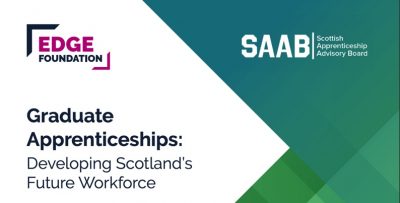The report commissioned by the Scottish Apprenticeship Advisory Board (SAAB) from the Edge Foundation, examines the current policy position of Graduate Apprenticeships (GAs) in Scotland and the future of the labour market. It draws on international examples of degree level work-based learning, to reflect on the opportunities GAs may offer in developing the future workforce of Scotland.
Amid the transition towards net-zero, the onset of the fourth industrial revolution (4IR) and the implications of Brexit and Covid-19, Scotland is adapting to changing priorities for sectors and regions across the economy. This report considers the future of the labour market and the important role higher-level apprenticeships can offer to support economic and social recovery, in addition to future skills needs.
Launched in 2017/18 and designed in collaboration between employers, universities, Skills Development Scotland (SDS) and the Scottish Funding Council (SFC), GAs are industry recognised and accredited qualifications which combine on and off the job learning at a higher level. GAs are noted for their role in:
- Enabling graduate apprentices to combine theory and practice, learning to use essential skills on the job.
- Facilitating opportunities for individuals to retrain and upskill existing employees.
- Offering a flexible learning experience which is widening opportunities for individuals from a range of backgrounds, including adults of all ages and those from under-represented groups.
Based on a series of interviews and focus groups and international examples from Norway, Lithuania and Wales, the report reflects on the successes of the GA programme thus far and highlights five key opportunities to further strengthen and grow such provision in Scotland. These are:
- Building a truly flexible delivery system to support GAs for a diversity of people and employers.
- Introducing an agile funding system led by employer demand and able to accommodate changes in skill needs.
- Developing more diverse future frameworks.
- Increasing awareness of the GA programme.
- Offering certainty and clarity of provision.
You can read the full report here.

